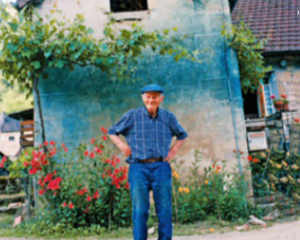Property in France
法國的房地產
Terminal value
最終價值
A ghoulish financial product gets a fresh lease of life
一種令人毛骨悚然的金融產品獲得了新生
Who has not dreamed of owning a pied-à-terre in Paris, or perhaps overlooking the Mediterranean? How about betting on the timing of a perfect stranger's death? In France you can combine the two. In sales of property en viager a buyer pays upfront for a residence while getting the keys only when the current owner dies. Covid-19 has revived interest in the morbid scheme.
誰沒有夢想過在巴黎擁有一套小公寓呢?誰又沒有夢想過能夠俯瞰地中海呢?賭一個陌生人的死亡時間怎么樣?在法國,你可以把這兩者結合起來。在(法國的)房產買賣中,買家提前支付房款,但只有在當前的房主去世后才能拿到鑰匙。新冠再次引起了人們對該病態項目的興趣。
The concept of viagers is nearly as old as property; rules laying out its modalities go back over a thousand years. Typically the seller gets cash for around a third of the value of the home at the time of the sale. Monthly payments from the buyer should add up to something nearer the full value of the property—assuming the seller dies at the time suggested by actuarial tables.
“終身房產”的概念幾乎和房地產一樣古老,制定其模式的規則可以追溯到一千多年前。賣方一般可以以房屋出售時價值的三分之一左右的價格獲得現金。買方每月的付款總額應該接近房產的全部價值——假設賣方在精算表推測的時間死亡。
For sellers not afraid of tempting fate, viagers offer the chance to cash in on their homes yet stay in them, with an income to boot. That appealed all the more as covid-19 began to spread, and death rates in retirement homes soared. Specialist brokers reported a surge in enquiries as elderly people sought to remain in their homes for longer.
對于不害怕冒險的賣家來說,終身房產提供了一個機會,他們可以在住在里面的同時將房子變現,獲得收入。隨著新冠開始蔓延,養老院的死亡率飆升,使得這一產業變得更有吸引力。專業經紀人報告稱,因為有越來越多的老年人想要待在家里,所以咨詢的人數激增。

Even then, the estimated 5,000 viager deals signed in France every year represent less than 1% of all property sales. But the scheme's long-expected demise never seems to come. Authorities promote it as a tax-efficient way for pensioners to cash in on rising property prices. Viagers also allow buyers to invest in property without a mortgage—the lender is, in effect, the seller-cum-tenant for life. The discount on properties sold for occupation at an unspecified time in the future is also an attraction.
即便如此,估計每年在法國簽署的5000份終身房產交易還不到所有房產銷售的1%。但該項目預期已久的消亡似乎永遠不會到來。當局將其推廣為一種節稅方式,以便讓養老金領取者從上漲的房價中獲利。終身房產還允許買家在無需抵押的情況下投資房產——貸方實際上是賣方兼終身承租人。在未來某個不確定的時間出售供居住的房產的折扣也是一個吸引力。
Buyers of viager properties have to guess how long the kindly old grandfather on the other side of the deal has left. Ads for such sales come with descriptions of the place in question—and details of the age of the seller. Canny widows looking to cash out are known to light cigarettes ahead of visits by potential buyers to hint at their unhealthy lifestyles. All parties are aware of the industry's freak event. In 1965 a 47-year-old notary bought a home en viager from a frail 90-year-old lady. He died 30 years later, but his widow kept making annuity payments, as the seller, Jeanne Calment, lived on to the world-beating age of 122.
購買終身房產的人必須猜測交易另一方那位慈祥的老爺爺還能活多久。像這類銷售的廣告上會附上對相關地點的描述——以及賣家的年齡細節。據悉,精明的寡婦們為了變現,會在潛在買家到訪前點煙,以此暗示她們不健康的生活方式。各方都意識到了這一行業的反常事件。1965年,一位47歲的公證人從一位虛弱的90歲老婦人手里買下一套終身房產。30年后他去世了,他的遺孀一直在為他支付年金,而賣家珍妮·卡爾芒卻活到了驚人的122歲。
Fans of viagers point out that betting on death is hardly unusual in finance: just look at the life-insurance industry. But the sinister undertones of such arrangements are hard to shake off. Some buyers have been suspected of hurrying nature along. In at least two murders currently in front of courts, authorities allege buyers did away with their tenants to gain possession of viager properties.
終身房產的粉絲們指出,金融業中把賭注押在死亡上在并不罕見:看看人壽保險行業就知道了。但是這樣的安排所暗含的險惡意味是難以擺脫的。人們懷疑有些買家在此過程中會耐不住性子。在已在法庭受理的至少兩起謀殺案中,當局聲稱是買家為了獲得終身房產而將租戶殺害。
譯文由可可原創,僅供學習交流使用,未經許可請勿轉載。











